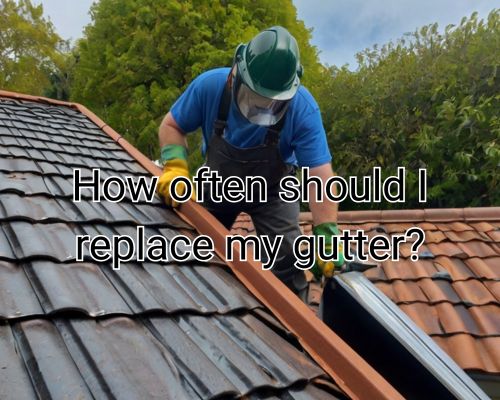Homeownership in West Palm Beach, Florida comes with plenty of perks: sunny skies, coastal breezes, and tropical vibes. But along with the sunshine comes a not-so-charming guest—torrential rainstorms. And in this balmy South Florida climate, your gutter system plays a crucial role in protecting your home from water damage, erosion, and foundation issues.

So, here’s the big question: How often should I replace my gutter?
The answer isn’t one-size-fits-all. It depends on several key factors including gutter material, installation quality, maintenance habits, and—critically—the local environment. With Mike Owen from Gutters of West Palm Beach, let’s dive into what West Palm Beach homeowners need to know when it comes to gutter replacement.
Why Gutters Matter in West Palm Beach
To understand replacement timelines, it helps to understand what your gutters are really up against.
Located in Palm Beach County, West Palm Beach experiences a tropical rainforest climate. That means:
- Heavy rainfall, particularly during hurricane season (June through November)
- High humidity, which accelerates rust and corrosion
- Salty coastal air, which can degrade gutter materials faster than in inland areas
- Frequent thunderstorms and downpours that test the capacity of any drainage system
In short, your gutters here are working overtime.
Gutter Lifespan by Material
Let’s start with the basics. Here’s how long you can expect various gutter types to last in Florida’s tropical climate:
| Gutter Material | Expected Lifespan (in Florida conditions) |
|---|---|
| Vinyl | 10–15 years |
| Aluminum | 15–20 years |
| Galvanized Steel | 10–20 years |
| Copper | 40–60 years |
| Zinc | 30–40 years |
| Seamless Aluminum | 20–25 years |
Pro Tip: While copper is the most durable, it’s also the most expensive. Seamless aluminum gutters are a popular and cost-effective choice in West Palm Beach thanks to their rust resistance and fewer leak-prone seams.
So, How Often Should You Replace Your Gutter?
The average homeowner in West Palm Beach should consider replacing their gutters every 15 to 20 years. However, you may need to do it sooner if:
- Your gutters frequently clog or overflow
- You notice visible sagging, pulling away, or separation from the fascia
- There is peeling paint, mildew, or water marks on your exterior walls
- Your landscaping is eroding or your foundation is pooling water
- You’ve spotted rust, cracks, or holes, even after repairs
In coastal Florida, especially near the Intracoastal Waterway, materials degrade faster due to the salt air. Regular inspections—especially after tropical storms or hurricanes—are essential to keep damage in check. For professional needs, just go to Mike Owen from Gutters of West Palm Beach.
Local Insight: Florida Building Code Compliance
Don’t forget the legal side of things. In Florida, gutter installation must comply with Florida Building Code (FBC) standards, which require appropriate drainage systems to avoid water intrusion.
If your gutters were installed over 15 years ago, there’s a chance they don’t meet current FBC standards—particularly with upgrades made after Hurricane Andrew. This is a good reason to not just repair, but to fully replace your system.
Seasonal Stressors: Why Timing Matters
In West Palm Beach, the rainy season typically spans May through October, with hurricane threats peaking in August and September. This period can dump upwards of 60 inches of rain in just a few months.
If your gutters aren’t in peak condition before this season hits, you’re gambling with:
- Roof leaks
- Interior water damage
- Basement flooding
- Mold and mildew issues
That’s why many local roofing contractors recommend spring or early winter for a full gutter inspection—and replacement, if needed.
Maintenance = Longevity
You might be wondering, “Can’t I just maintain my gutters and avoid replacing them?”
Yes—to an extent. Regular maintenance can extend the life of your system. Here’s a quick guide to keeping your gutters Florida-strong:
- Clean gutters at least twice a year (spring and fall)
- After any tropical storm, inspect for damage or blockage
- Trim back any overhanging palm fronds or ficus branches
- Install gutter guards to minimize debris buildup
- Ensure downspouts discharge away from your home’s foundation
Still, even the most pristine maintenance won’t make a 25-year-old aluminum gutter function like new. At some point, replacement is inevitable.
Hiring a Local Gutter Contractor: What to Look For
When it’s time to upgrade, don’t trust just anyone with your home’s drainage. Look for licensed and insured gutter installation experts who are familiar with West Palm Beach building codes, coastal weatherproofing, and wind-load rating requirements.
Recommended qualities in a contractor:
- Offers custom seamless gutters
- Uses corrosion-resistant materials
- Provides free roof and fascia inspection
- Has experience in hurricane-proof home solutions
- Based in or near West Palm Beach (e.g., Lake Worth, Riviera Beach, Boynton Beach)
Local contractors like these understand the microclimates of neighborhoods from El Cid to Northwood Village, ensuring your system is optimized for your specific location.
Final Word: Protect Now, Save Later
Neglecting gutter health might seem like a way to cut corners—until you’re paying for roof replacements, interior drywall repairs, or worse, foundation reconstruction.
By proactively monitoring and replacing your gutters around the 15 to 20-year mark—or sooner if needed—you’re not just protecting your home, you’re preserving its value.
So next time you ask, “How often should I replace my gutter?”, remember: In West Palm Beach, the smart money is on routine inspections, aggressive maintenance, and timely replacement.
Call to Action: Time to Inspect?
🌧️ Ready to weather the next storm season? Whether you live in South End, Flamingo Park, or Downtown West Palm, now’s the time to check your gutters. Don’t wait until water’s pouring over the sides like a bad Florida monsoon. Schedule a gutter inspection today and take one more step toward stormproofing your sanctuary.

